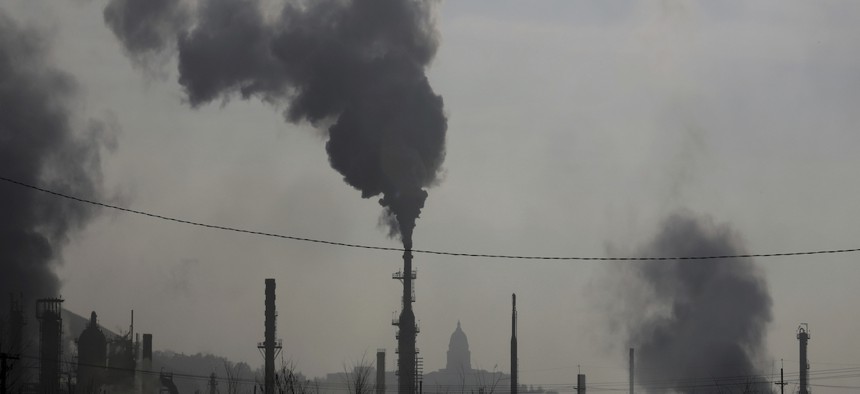Study: Air Pollution Increases Risk of Death from Coronavirus

In this Dec. 10, 2018 photo, smokestacks near an oil refinery are seen in front of the Utah State Capitol as an inversion settles over Salt Lake City. Associated Press
The study by researchers at Harvard University's public health school is the first nationwide research to find a link between high rates of air pollution and higher rates of death from the novel coronavirus.
Coronavirus patients who reside in cities with higher levels of air pollution are more likely to die from the virus than people in places with cleaner air, according to a Harvard University study released this week.
The study, conducted by five researchers from the Harvard T.H. Chan School of Public Health, analyzed air-pollution data and coronavirus death rates from more than 3,000 counties in the United States. According to their results, long-term exposure to higher levels of fine particulate matter—air pollution known as PM 2.5—is linked to increased death rates from Covid-19.
“The results of this paper suggest that long-term exposure to air pollution increases vulnerability to experiencing the most severe Covid-19 outcomes,” researchers wrote.
The study is the first to find a statistical link between air pollution from before the pandemic and the severity of the virus, though health experts have for weeks mused that poor air conditions could exacerbate the respiratory symptoms—cough, shortness of breath—associated with the disease.
“Given what we know now, it is very likely that people who are exposed to more air pollution and who are smoking tobacco products are going to fare worse if infected with Covid than those who are breathing cleaner air, and who don’t smoke,” Aaron Bernstein, the interim director of the Center for Climate, Health, and the Global Environment at the Harvard T.H. Chan School of Public Health, told the Washington Post.
Even a small increase in air pollutants can mean a greater risk of death, the study found. A change as small as 1 microgram per cubic meter led to a 15% spike in death rates for patients in heavily polluted cities, even when considering other factors like smoking, weather and population density. That means that if Manhattan had lowered its 17-year particulate matter exposure by a single unit “we would have expected to see 248 fewer Covid-19 deaths among a total of 1,905 deaths up to April 4,” researchers wrote.
The findings are not unprecedented, researchers noted, and “are consistent with findings that air pollution exposure dramatically increased the risk of death during the Severe Acute Respiratory Syndrome (SARS) outbreak in 2003, which is caused by another type of coronavirus.”
The results of the study come a week after the Trump administration announced its final rule to roll back regulations that require auto manufacturers to produce more fuel-efficient vehicles. In a statement, Andrew Wheeler, head of the Environmental Protection Agency, said the change was intended to “strike the right regulatory balance for the environment, the auto industry, the economy, safety and American families.”
“[The change] does all of those things by improving fuel economy, continuing to reduce air pollution, and making new vehicles more affordable for all Americans,” he said.
But documents from the administration predicted that the changes could actually result in hundreds of premature deaths from air pollution as well as additional cases of respiratory ailments.
The Harvard study, researchers concluded, was further proof that regulations on air pollution are crucial to public health, particularly during a widespread outbreak of a respiratory virus.
“The results of this study also underscore the importance of continuing to enforce existing air pollution regulations during the Covid-19 crisis,” they wrote. “Based on our result, we anticipate a failure to do so can potentially increase the Covid-19 death toll and hospitalizations, further burdening our health-care system and drawing resources away from Covid-19 patients.”
NEXT STORY: NY assembling COVID-19 tech SWAT teams





